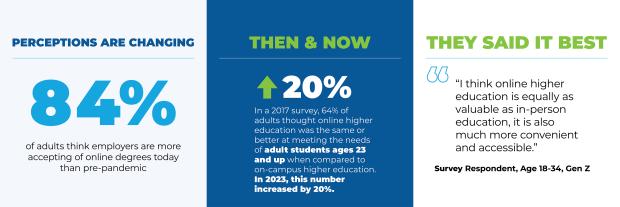2023 Survey Shows Online Degrees are More Accepted and Respected Than Ever
How credible is an online education? As it turns out, maybe more so than expected. In an era where education is evolving at an unprecedented pace, the credibility of online learning has become a topic of significant interest and discussion. Champlain College Online reported the results of a new survey exploring how perceptions of online higher education have changed over the last five years. More than 2,000 U.S. adults ages 18-55 were polled about their attitudes and opinions on the value and application of online higher education.
The transformative impact of the pandemic in 2020 compelled academic institutions worldwide to reimagine traditional teaching methods, pushing online education into the spotlight. This change, initially driven by necessity, represents a shifting paradigm in online higher education.
High-quality online education provides a level of accessibility, flexibility, and cost-effectiveness that can be life-changing for students.
“The COVID-19 pandemic introduced more institutions and students to the concept of remote learning than ever before,” said Chris Montagnino, Vice President of Champlain College Online. “While there are crucial differences when comparing the remote education seen during the pandemic and intentionally designed online education, high-quality online education provides a level of accessibility, flexibility, and cost-effectiveness that can be life-changing for students. We've often talked about adult learners benefiting the most from online education options, and we're excited to see that both our survey data and our enrollment trends reflect a growing population of younger adults pursuing online degrees and understanding their value."
The statistics tell a convincing story — online degree programs are viewed as a strategic choice rather than a compromise for those seeking a dynamic and accommodating educational journey. Among both adult learners and traditional-aged undergraduates, online degree programs are becoming more desirable, boasting more flexibility and better work-life balance. The hybrid and fully-remote offerings implemented by academic institutions during the pandemic have not only endured but multiplied in number, attesting to the growing appeal of online education.

The collective results from the 10-question survey show that online degrees are perceived as more credible and more broadly accepted than in the pre-pandemic period, with 84% of adults thinking employers are more accepting of online degrees today than pre-pandemic and 72% of adults believing online education is a more reputable way to get a degree than it was five years ago.
In the past five years, Champlain College Online fielded two surveys, one in the fall of 2017 with Full Circle Research and one in the summer of 2023 with Researchscape International. Both used randomized, nationally representative samples of 1,004 (2017) and 2,083 (2023) U.S. adults designed to create equivalent segments by gender and region to make meaningful comparisons across subgroups. The recent data paints a compelling picture of the growing acceptance and efficacy of online education among adults.
Key takeaways include:
- 90% of adults find online education effective in equipping students with the knowledge and skills necessary to succeed in their careers
- 80% of adults would consider an online program if enrolling in undergraduate or graduate education
- 77% of adults think online higher education is the same or better at meeting the needs of students ages 23+ when compared to on-campus higher education (a 20% increase from 2017)
- 64% of adults believe the value of an online degree for the tuition dollar is equal to or more than the value of an on-campus degree (a 20% increase from 2017)
- 53% of adults think online higher education is the same or better at meeting the needs of students ages 17-22 when compared to on-campus higher education (a 33% increase from 2017)
These statistics collectively underscore the evolving positive perceptions surrounding online education, signaling a transformative shift in how individuals view and embrace virtual learning as a credible and valuable pathway to academic and career success.
Comprehensive survey result data is available, contact bcolley@champlain.edu to request more information.






